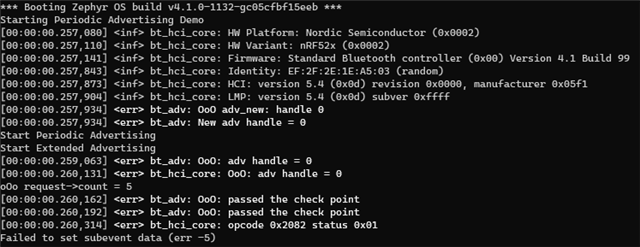Hi,
I am currently investigating the possibility of using Nordic nRF52840 as the PAwR advertiser and the other device (from a different vendor) as the PAwR scanner.
I don't want to include in the PAST procedure in my first demo, and found this ticket related: PaWR subevent data - Nordic Q&A - Nordic DevZone - Nordic DevZone
I have went through the recommended `periodic_adv_conn` sample application. But I am not really sure whether it is possible to get this working. Moreover, I am actually not using the STACK on the other device, but writing the application based on the radio driver.
Would appreciate it if you can give some suggestions



